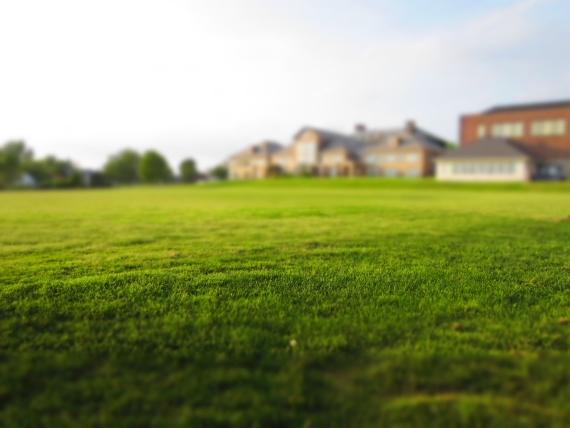How Much Land Do You Need To Build a House?
Posted: January 18, 2016 by LandCentury

If youre planning on building your dream home or renting out a newly built home, one of the first things youll need to do is purchase a plot of land. The question is: how much land do you need? The answer to this question depends on a number of factors, including home size, local zoning requirements, and your needs. But looking at the average lot size for new homes can also help give you an idea of how much land youll need.
The Average Lot Size of New Single Family Homes
Lot sizes have fluctuated in the United States since 1976. In 1977, the average home had a lot of 16,150 ft.². In 2010, the average lot size was about 17,590 ft.². In between these two dates, plot sizes have dropped to as small as 13,845 in 1989 and peaked at 18,433 in 2008. These figures include properties inside and outside of metropolitan statistical areas.
Naturally, properties outside metropolitan areas typically have more land. In 2010, 27,363 ft.², much smaller than the previous years average of 32,664 ft.². Location also plays a major role in the plot size. Homes in the Northeast surprisingly have more land, with the average home having 32,955 ft.² of land in 2010. In 2008, land peaked at 44,781 ft.² for the average home. Not surprisingly, the West has the least amount of land, with the average home having an average plot size of 9694 ft.². Land has always been scarce in the West, with the average plot size being just 11,152 in 1992. No data from the Census Bureau is available for the West before this date.
While the minimum amount of land that you will need to build your home will largely depend on local zoning requirements and the size of the home, these averages can also help you gain a better understanding of what buyers are looking for or expecting.
Purpose of the Home
Now that you understand what the average plot size is for a home, its time to calculate how much land your particular home will need. One of the first things youll need to focus on is the purpose of the home.
- Will this be your dream home?
- Will you rent out the home?
- Will you use the home as part of a farming or homesteading operation?
The answers to these questions will better help you determine how much acreage youll need. If youre simply building a home to rent it out, you may not care as much about having a large property. However, if youre building your dream home, you may have plans to grow a large, lush garden or simply enjoy peace and quiet. In this case, youll need an acre or more most likely.
If you have plans to set up a farming or homesteading operation, youll need several acres of land. Keep in mind, however, that the acreage will be based on your operation plans and not necessarily the home itself. You dont need a lot of land to build a home, but you do need a lot of land if youre going to raise animals and grow crops in addition to building a home. Some areas also have regulations in place regarding how much acreage is needed for animals for health, sanitation and safety reasons.
Consider Your Building Plans
Another key thing that you will need to look at is your homes building plans. The size of your home will largely determine how much land you will need. If youve yet to choose a plan for your home, consider doing so before trying to determine how much land youll need.
If you already have a plot of land in mind, you can subtract the square footage of the home from the plots square footage (43,560 square = 1 acre). This will give you an idea of the amount of back, front and side yard will have. You also need to consider the fact that youll need to build your home at least 25 feet back from the road. Remember, in most areas, the city and county have a right to use roughly 10-feet of your property for the purpose of widening the road or using the land for utilities. You need to ensure that you purchase a piece of land large enough to not only fit the home, but also allow for this additional 25 feet of clearance.
Consider Property Lines
Another major thing you'll need to keep in mind is the lands property lines. These lines will also be your neighbors property lines. When calculating how many acres you will need to build your home, take into consideration how close your neighbors will be and how close they can build. Ensuring that you are able to build your home a fair distance from property lines will maximize your privacy and help you maintain it.
Dont Forget Utilities
Utilities also take up space, and the importance of this additional space is often overlooked. If the property will have a septic and well, there will likely be local regulations that will require the home to be a certain number of feet away from each of these utilities. Youll need to purchase enough land to allow for this clearance while ensuring that the home isnt too close to the property lines or the road.
Theres a lot to consider when purchasing land to build a home, and size is typically the first major concern. If you already own a piece of land, you do have the option of changing your home plans if you find that the property simply isnt large enough. If youve yet to buy the land, its a wise idea to sit down and calculate the minimum acreage youll need to build your new home.
If youre still unsure of how to calculate your land needs, consider consulting with a builder. Builders will be able to give you an idea of whether you can adequately fit a home on a particular plot or supply you with an estimate of how much land youll need to build your home while meeting your standards or needs.
The Average Lot Size of New Single Family Homes
Lot sizes have fluctuated in the United States since 1976. In 1977, the average home had a lot of 16,150 ft.². In 2010, the average lot size was about 17,590 ft.². In between these two dates, plot sizes have dropped to as small as 13,845 in 1989 and peaked at 18,433 in 2008. These figures include properties inside and outside of metropolitan statistical areas.
Naturally, properties outside metropolitan areas typically have more land. In 2010, 27,363 ft.², much smaller than the previous years average of 32,664 ft.². Location also plays a major role in the plot size. Homes in the Northeast surprisingly have more land, with the average home having 32,955 ft.² of land in 2010. In 2008, land peaked at 44,781 ft.² for the average home. Not surprisingly, the West has the least amount of land, with the average home having an average plot size of 9694 ft.². Land has always been scarce in the West, with the average plot size being just 11,152 in 1992. No data from the Census Bureau is available for the West before this date.
While the minimum amount of land that you will need to build your home will largely depend on local zoning requirements and the size of the home, these averages can also help you gain a better understanding of what buyers are looking for or expecting.
Purpose of the Home
Now that you understand what the average plot size is for a home, its time to calculate how much land your particular home will need. One of the first things youll need to focus on is the purpose of the home.
- Will this be your dream home?
- Will you rent out the home?
- Will you use the home as part of a farming or homesteading operation?
The answers to these questions will better help you determine how much acreage youll need. If youre simply building a home to rent it out, you may not care as much about having a large property. However, if youre building your dream home, you may have plans to grow a large, lush garden or simply enjoy peace and quiet. In this case, youll need an acre or more most likely.
If you have plans to set up a farming or homesteading operation, youll need several acres of land. Keep in mind, however, that the acreage will be based on your operation plans and not necessarily the home itself. You dont need a lot of land to build a home, but you do need a lot of land if youre going to raise animals and grow crops in addition to building a home. Some areas also have regulations in place regarding how much acreage is needed for animals for health, sanitation and safety reasons.
Consider Your Building Plans
Another key thing that you will need to look at is your homes building plans. The size of your home will largely determine how much land you will need. If youve yet to choose a plan for your home, consider doing so before trying to determine how much land youll need.
If you already have a plot of land in mind, you can subtract the square footage of the home from the plots square footage (43,560 square = 1 acre). This will give you an idea of the amount of back, front and side yard will have. You also need to consider the fact that youll need to build your home at least 25 feet back from the road. Remember, in most areas, the city and county have a right to use roughly 10-feet of your property for the purpose of widening the road or using the land for utilities. You need to ensure that you purchase a piece of land large enough to not only fit the home, but also allow for this additional 25 feet of clearance.
Consider Property Lines
Another major thing you'll need to keep in mind is the lands property lines. These lines will also be your neighbors property lines. When calculating how many acres you will need to build your home, take into consideration how close your neighbors will be and how close they can build. Ensuring that you are able to build your home a fair distance from property lines will maximize your privacy and help you maintain it.
Dont Forget Utilities
Utilities also take up space, and the importance of this additional space is often overlooked. If the property will have a septic and well, there will likely be local regulations that will require the home to be a certain number of feet away from each of these utilities. Youll need to purchase enough land to allow for this clearance while ensuring that the home isnt too close to the property lines or the road.
Theres a lot to consider when purchasing land to build a home, and size is typically the first major concern. If you already own a piece of land, you do have the option of changing your home plans if you find that the property simply isnt large enough. If youve yet to buy the land, its a wise idea to sit down and calculate the minimum acreage youll need to build your new home.
If youre still unsure of how to calculate your land needs, consider consulting with a builder. Builders will be able to give you an idea of whether you can adequately fit a home on a particular plot or supply you with an estimate of how much land youll need to build your home while meeting your standards or needs.




